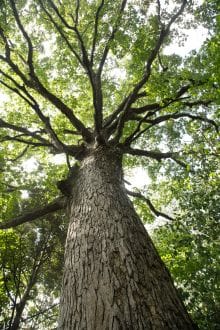
Link to the full source article
RSS feed source: National Science Foundation
A group of researchers from the University of Kentucky, The University of Tennessee and Indiana University, including those supported by the U.S. National Science Foundation, have collaborated with scientists from the U.S. Forest Service and others to produce the first complete genome for the white oak (Quercus alba), a tree that provides large amounts of timber and is the primary species used in barrels for aging spirits.
Credit: Matthew Barton, University of Kentucky
The white oak at Makers Mark Star Hill Farm that provided the sample for recent NSF-funded work to develop a haploid genome for the species, which can be used in conserving this economically important tree.
Data to complete the genome came from a range of academic sources, the Forest Service, state forest services and industry. By combining those data into an unbiased annotation of the white oak’s genes, the researchers have created a resource to understand genetic diversity and population differentiation within the species, assess disease resistance and the evolution of genes that enhance it, and compare with other oak genomes to determine evolutionary relationships between species and how the genomes have evolved.
“Plants, including trees, help meet society’s needs for food, fuel, fiber and, in this case, other key economic services. Having genomic data like this helps us address
Click this link to continue reading the article on the source website.
